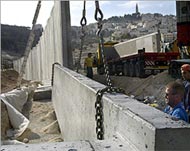Sharon clashes with army chief
Israel’s army chief has privately voiced doubts about Prime Minister Ariel Sharon’s threats to take unilateral steps if peace talks with the Palestinians fail.

Lieutenant-General Moshe Yaalon’s reported comments published on Sunday in Israel’s Haaretz newspaper added to criticism that he and four former Israeli security chiefs levelled recently against Sharon’s brutal policies towards the Palestinians.
Asked about the report, an army spokesman said the military did not comment on accounts of purported private remarks.
Sharon raised the possibility in public remarks on Thursday that he would take unilateral moves, including the dismantling of Jewish settlements, should efforts to move forward on the US-backed “road map” collapse.
All Jewish settlements on occupied Palestinian territories are illegal under international law, a stance not recognised by Israel.
Under the so-called “Sharon Plan”, Israel would then unilaterally draw a border for a Palestinian state in the occupied Gaza Strip and in only less than half of the West Bank, reported the daily.
This is much smaller than a homeland envisaged by Palestinians, who have been waging the Intifada for three years against Israel’s occupation.
Challenging government policy
Yaalon argued that unilateral removal of settlements would confer “support to terror” in the face of the Intifada and should be done only as a part of a comprehensive peace deal.
 |
|
Israel’s apartheid wall has come |
Yaalon has also said that tough travel restrictions on Palestinians only boosts support for resistance fighters, challenging government policy.
The Lieutenant-General’s remarks added to growing calls at home and abroad for Sharon to end the Intifada and bolster the status of some Palestinians perceived to be opposed to fighters by lifting blockades imposed on Palestinian cities and reining in settlers.
Israel is coming under international criticism for building its apartheid wall, slicing off some of the most fertile parts of the occupied West Bank and separating farmers from their lands.
Israel says the concrete barrier is aimed at keeping out resistance fighters. But Palestinians fear it is aimed at demarcating the borders of a future Palestinian state.